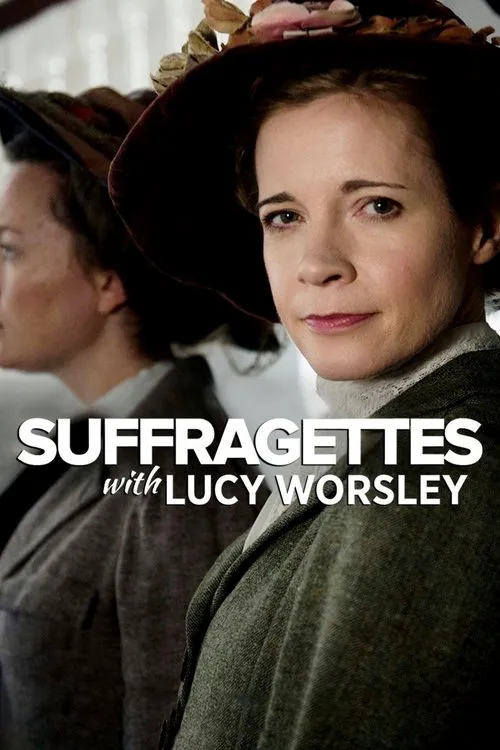Suffragettes, with Lucy Worsley

Trama
In the early 20th century, the United Kingdom was a society governed by traditional social norms and expectations. Women were largely confined to domestic roles, their participation in politics and public life heavily circumscribed. However, a growing movement of women, driven by a desire for equality and the right to vote, began to challenge this status quo. This was the era of the suffragettes, a name coined by their detractors to describe a group of women deemed unruly, militant, and unwomanly in their pursuit of suffrage. At the heart of this drama is Lucy Worsley, a historian who, as a participant-observer, immerses herself in the world of these remarkable women, shedding light on their lives, their motivations, and their struggles. It is 1901, and Emmeline Pankhurst, a charismatic leader and one of the most prominent figures of the suffrage movement, has already been imprisoned multiple times for her activities. However, her legacy extends far beyond her own exploits, inspiring a new generation of women to take up the cause. Among these women are a group of young, working-class suffragettes who, despite their modest backgrounds and limited resources, possess an unwavering determination to secure their right to vote. These remarkable women, including Annie Kenney and Christabel Pankhurst, Emmeline's daughter, are from the north of England, where the textile industry has created a reservoir of educated and fiercely independent women. As they begin to organize and agitate, they face stiff resistance from the establishment, which views them as a threat to the social order. Yet, undaunted by the challenges ahead, the suffragettes employ a combination of nonviolent direct action, civil disobedience, and militancy to draw attention to their cause. As Lucy Worsley delves deeper into the lives of these women, she discovers that their experiences were far from uniform. While some had middle-class connections that allowed them to access education and career opportunities, others were struggling to make ends meet, working in factories, and suffering under the harsh conditions of poverty. This diversity of backgrounds and experiences underscores the suffragettes' commitment to a broader social justice agenda, one that seeks to address the systemic inequalities faced by women across the spectrum. One of the key figures of the movement, Emily Davison, a devoted follower of Emmeline Pankhurst, stands out for her unwavering dedication to the cause. Her actions, marked by increasing militancy and sacrifice, take on a tragic significance as the story unfolds. Through Lucy Worsley's observations and reflections on Emily Davison's journey, the film humanizes this extraordinary woman, dispelling the myth that she was simply a self-destructive, attention-seeking figure. Instead, it reveals the complexities of her personality, her unshakeable convictions, and her ultimate sacrifice, which had far-reaching consequences for the suffrage movement. The film also highlights the pivotal role played by key events and individuals, including the founding of the Women's Social and Political Union in 1903 and the emergence of Winston Churchill, then a young politician, as a vociferous opponent of suffrage. These moments demonstrate the suffragettes' skill in leveraging public opinion, mobilizing support from politicians, and negotiating the complex web of alliances and rivalries within the movement. Moreover, by immersing herself in the world of these women, Lucy Worsley illuminates the emotional and psychological toll of their activism. The film captures the suffragettes' intense emotional bonds with one another, forged through shared struggles, shared sacrifices, and shared moments of exhilaration. It also reveals the impact of imprisonment, beatings, and other forms of repression on their mental health and well-being, underscoring the human cost of their fight for equality. As the year 1910 draws to a close, the suffragettes are at a crossroads. Their movement has captured the public's imagination, but progress is slow, and the authorities are determined to crush their spirit. In this tumultuous backdrop, Lucy Worsley finds herself reflecting on the enduring legacy of the suffragettes and the women who dared to challenge the status quo. The film concludes by emphasizing the power of collective action, the strength of solidarity, and the capacity for individual women to drive social change. As a contribution to the ongoing conversation about women's rights and the struggle for equality, the film serves as a powerful reminder of the sacrifices made by these remarkable women and the profound impact of their activism on the lives of women everywhere. Through Lucy Worsley's thoughtful narration and the participants' engaging recollections, the suffragettes' story is reframed as a testament to human courage, resilience, and hope, a testament that transcends the confines of time and resonates with contemporary struggles for justice and equality.
Reseñas
Recomendaciones



